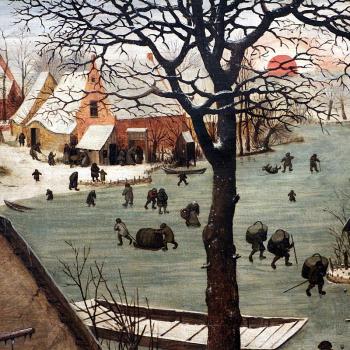Fr. Kirk’s life’s work clearly affected a great number of people; his dedication to the poor, the hopeless, and the marginalized (especially across racial lines—we ought to remember that Emmaus House is in Harlem, a part of Manhattan notable for, at minimum, the Harlem Renaissance, a major black artistic movement) cannot be denied. If for this alone, he ought to be remember. His legacy is one of absolute service, of work for and among the forgotten. We call to mind Dorothy Day (and for good reason) to bolster our belief in the transformative power of Christian faith; we ought to recall Fr. Kirk too. He gives those of us from the Byzantine tradition hope in our tradition of justice, asking us to call to mind words like these from St. John Chrysostom:
Having said “The first and great commandment is ‘You shall love the Lord your God,’” he added “and the second … is like it. ‘You shall love your neighbor as yourself.’” And see how with nearly the same excellence he also requires this. For as concerning God, he said “With all your heart”: so concerning your neighbor, ‘as yourself’ is the same as ‘with all your heart.” If this commandment were duly observed there would be neither slave nor free, neither ruler nor ruled…. There would be no poverty, no unbounded wealth if there were love, but only the good parts that come from each. From the one we should reap its abundance, and from the other its freedom from care and should neither have to undergo the anxieties of riches nor the dread of poverty. (Homilies on First Corinthians)
But there’s one last chapter to this priest’s story that interests me, both for the personal reaction it effects and for the larger issues it speaks to for us in 2018.
In 2004, Fr. Kirk joined the Orthodox Church in America. No source I can find says why. I perplexed me at first. Whatever one thinks about the Schism, these days it is (at least somewhat) easier to associate converts to Eastern Orthodoxy with conservatism. Many carry their anti-Catholicism over from fundamentalist Protestant backgrounds; others leave the Catholic Church to get away from our supposedly-liberal bishops. Matthew Heimbach serves as a metonym for larger problems in American Orthodoxy. The theology of re-baptism and denying the Sacraments of other Apostolic Churches reflects poorly the spirit that animated Fr. Kirk.
Meanwhile the Catholicism of Pope Francis never seems to stop convincing people that the Church is sliding into an age of (depending your position) beautiful mercy or unconscionable, secular apostasy.
After thinking about it, though, it hit me: Fr. Kirk converted in 2004. I wonder what he’d think of how these Churches look today, but back then Orthodoxy didn’t have the sort of reputation it does (at least when one encounters certain converts) as it does today (and, to be clear, I love Orthodoxy. I love my brothers and sisters and their traditions, but that doesn’t mean we can simply ignore the reputation created by this group of converts). Catholicism was still in its Culture Wars moment, a trend only now really breaking down. It’s unclear, but I can’t help but speculate that these differences played some role (along with the general discomfort it’s far to easy for Eastern Catholics to feel).
And I think there’s a lesson here: times change and history obscures, but the inspirational works of our forerunners ought not be forgotten. Fr. Kirk left the Catholic Church (for reasons that don’t seem to be readily available). This decision may perplex (if only because the terrain is so different now), but it cannot obscure the beauty of his soul, the reminder he brings to recall that Christ lives in us when we find Him in the least among us.
One a final note, please consider donating to Emmaus House to help them continue to do the amazing work they do.













